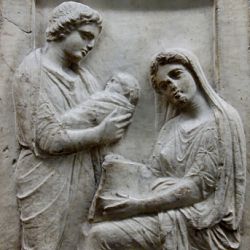29 - What's in a Name? Plato's Cratylus
Posted on
Peter discusses Plato's contribution to the philosophy of language, the Cratylus, a dialogue which uncovers a theory of Heraclitean flux hidden within ancient Greek.
Themes:
Further Reading
• R. Barney, Names and Nature in Plato's Cratylus (London: Routledge, 2001).
• G. Fine, "Plato on naming," Philosophical Quarterly 27 (1977), 290-301.
• M.M. Mackenzie, "Putting the Cratylus in its place," Classical Quarterly 36 (1986), 124-50.
• M. Schofield and M. Nussbaum (eds), Language and Logos (Cambridge: Cambridge University Press, 1982).
• D. Sedley, Plato's Cratylus (Cambridge: Cambridge University Press, 2003).







Comments
Forms
It sounds to me, listening to these episodes on the forms, that plato thought of the building blocks of our world to be adjectives. The adjectives themselves are absolutes, and the verbs and nouns are made up of building block adjectives. Pygmie Elephants are elephants made up of less largeness and more smallness. Running is like walking, but made up of more fast and less slow. Comments?
In reply to Forms by Alexander Johnson
Adjectives
Maybe, yes. However there are passages that envision Forms for things that would be referred to by nouns, for instance "bed" in Republic 10. Perhaps closer to the mark would be "properties" since being a bed is a property, as is being small. The idea could be that Forms are intended to explain the nature and unity of properties shared by many things.
In reply to Adjectives by Peter Adamson
ALMOST MISSED THIS
Here I go again, Peter. You can tell me to knock it off.
“being a bed is a property” Huh?
“What is that over there?” “That is a bed.”
I don’t think ‘bed’ is being said of or predicated of that. I don’t think bed is a property of that. Rather is not that over there being identified as a bed? Is not the usage here the ‘is’ of identity and not the ‘is’ of predication?
Suppose it is replied that what was asserted to be a property was being a bed, not bed. OK, let’s see what being a bed is. Uh oh—equivocal term. Suppose we take the focal meaning of being a bed as an article of furniture with mattress and coverings used for sleeping. But, of course, a bed is also an article of furniture with mattress and coverings used for sleeping. So the alleged property of being a bed and a bed are the same. But a bed is not a property.
So here we go again and we can use some jargon. If being a bed is an accidental feature of that thing over there (since I’m looking for firewood), then being a bed is being said of or is a property of it. But if the focal meaning given above is the essence of that thing over there, then I’m not ascribing a property to it but uncovering its identity. A thing is what it is. Or better, a thing is what kind of thing it is.
But it might be replied that the the essence of some kind of thing is its essential properties, so being a bed is one or more properties. Or are we mistaken in thinking that so-called essential properties are properties at all? They are not said of a thing but rather are the thing, and that is identification, not predication.
You see, I end up having to dialogue with myself. I’ve already spoken, as best I can, with Plato about how beds participate in Bed and with Aristotle about how being a bed inheres in beds, and I’m beginning to believe that neither thought that participating in a Form or being enformed was conjugating, whether yoking or otherwise, with a property.
Yes, much ink has been shed over this but I don’t intend to drown in it. But I am ready to shed some life-blood. What do you think, Peter?
In reply to ALMOST MISSED THIS by Otter Bob
Being a bed
Well, it is by no means easy to say for sure what counts as a property - if we want to have properties at all. But I find it intuitive to say that, although a bed is clearly not a property, "being a bed" is one, because you could predicate it of the material the bed is made from, though you might retort that the property in question is more like "bed-shaped" than "bed." I agree thinking of "bed" as a property is thus a little strange but the reason I suggested it is that we may want to have a unified account of Plato's Forms and it's obvious that some of the Forms he talks about are properties, like largeness or justice or beauty. It might be better though to use terminology that is less current in philosophy now and talk about, e.g. "characters" so we could say that some wood has the "character" of being a bed, like a just person has the "character" of justice. That is less illuminating, but perhaps also less misleading.
In reply to Being a bed by Peter Adamson
Bedding It Down
Certainly not “bed-shaped” for a bed is what it is because of how it functions. We’d have much more trouble saying what shape a bed-shape is. I have no problem with considering being a bed a property and a property of the wood as the bed’s matter. Although I still want to keep in mind the puzzlement of how that property, as I more fully stated it, unifies with the matter so as to make a bed. I think I know Aristotle’s answer in terms of actualizing a potentiality. But I’m not fully satisfied with its cogency.
But switching to “character” is good, although I’d rather go with “factor”. We all hear now that the material and formal causes are best thought of as explanatory factors so that we don’t identify cause with just efficient cause. But with this caveat: in the current scientific way of talking as I overhear it, to say something is an explanatory factor is to suggest that it is some kind of model we invent to answer our scientific explanatory questions. I don’t buy that. Rather, these are factors we discover in the nature of things that are true of them per se, and as such they factor well into our explanations. But I agree that is a contentious debate.
But thanks and forward on--->
I appreciate this series -…
I appreciate this series - really making me think and appreciate this stuff! Some of it I have a hard time just going with. My first question about forms is: How can a form create itself? Best I can see while browsing wikipedia is that Forms are universal, unchanging, have always existed etc. But then why these specific forms? I can't cite the specific instance, but earlier a group (sophists?) you mentioned said that there needs to be a reason for everything the world is built on, so you can't just pick something arbitrarily and assume the world works that way. If there's no reason for Forms to exist, they don't. And if there is a reason for Forms to exist, then they have a cause, and the only cause seems to be their own existence requiring them to exist. Huh???
Anyway, in terms of language, yes obviously it's because of how we're raised, but - BOUBA KIKI! BOUBA KIKI! That is all.
In reply to I appreciate this series -… by Jordan
Creation of Forms
Well, I think the answer to how Forms are created is that they aren't: they are eternal and are just there, as it were. Thus I think most Platonists would say that there is simply a brute fact of the matter about what is real and what is not, and what is real are the Forms (they are the realm of "being"), so this is why the Forms that exist are those Forms and not other ones you might imagine (e.g. a Form of Centaur). As Platonism gets taken up in the creationist traditions though, your question becomes more pressing and it is often speculated that the Forms are God's ideas, and are perhaps subject to His choice as to which ideas to think about or which Forms to create.
language
I love this podcast because I have my own theory about language which dovetails well with the universality of words and their subsequent use. To be as quick as I can in telling this, I had an unexpected child when I was 40. Having taught my older 2 to read using phonics I got this idea to make a simple phonics video which I showed her off and on from the time she was 4 months. At 4 when I was going to teach her to read I didn't have to really. Every time I read a word to her once she always knew that word the next time she saw it. When her reading vocabulary was large enough I didn't have to introduce new words to her. She got them herself from the context of what she was reading. Today she is a graduate of Yale and writes grants, poetry, and mostly political theory. I tell people what if that amazing ancient Athens who virtually gave us our modern western world had the practice of teaching their children at very early ages which might be the cause which produced the effect of that amazing culture of geniuses.
In reply to language by Jerrie
Language
Wow, that's an amazing story. The only thing that would make it even better is if your daughter listens to the podcast too?
By the way my brother, who occasionally gets mentioned in the podcast, also went to Yale, got his PhD there.
In reply to Language by Peter Adamson
Athens genius
I will mention the podcast to her. Busy lady though
Add new comment